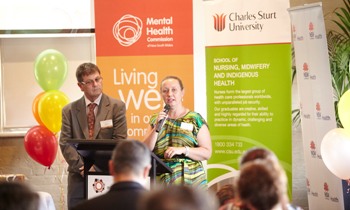 Cultural
understanding and respect were key to providing better mental health support to
Aboriginal people and communities, and the employment of highly trained
Aboriginal mental health workers should be central to the state's response,
said the NSW Mental Health Commissioner, Mr John Feneley, on Friday 5 December.
Cultural
understanding and respect were key to providing better mental health support to
Aboriginal people and communities, and the employment of highly trained
Aboriginal mental health workers should be central to the state's response,
said the NSW Mental Health Commissioner, Mr John Feneley, on Friday 5 December.
Mr Feneley was speaking at a Sydney event to celebrate 21 years of the Djirruwang program – NSW's only bachelor degree program for Aboriginal people leading to the mental health worker qualification. The Bachelor of Health Science (Mental Health) is offered by Charles Sturt University (CSU) in partnership with NSW Health.
A week after the Productivity Commission's Overcoming Indigenous Disadvantage report* highlighted growing rates of psychological distress and increasing self-harm among Aboriginal and Torres Strait Islander people, Mr Feneley said it was time to recognise the critical importance of social and emotional wellbeing for Aboriginal people and communities.
"In the Commission's extensive community consultations, Aboriginal people have told us again and again that they want mental health support that shows respect for their culture, including the importance of family and connection to traditional lands, and which recognises the deep suffering that results from past and continuing disadvantage, racism, early death, and separation from family members through high rates of incarceration," Mr Feneley said.
"Aboriginal mental health workers have that understanding at the heart of their professional training, and the success of Djirruwang over its 21 year history means we now have a level of expertise in the NSW mental health system that we can work to expand upon. I congratulate the leaders of the Djirruwang program, its graduates and current students on this coming-of-age."
Ms Faye McMillan, Djirruwang program director at CSU, said, "It has been a privilege and a delight to watch Djirruwang's graduates take their rightful place in clinical teams across NSW and further afield. They bring with them a rigorous education and a set of perspectives that emphasise the context of people's whole lives in their families and communities, beyond a narrow definition of mental health. That is of benefit to both Aboriginal and non-Aboriginal clients."
In NSW, 103 Aboriginal people have graduated through Djirruwang, and an additional 35 who live interstate have successfully completed the distance education program.
Mr Tom Brideson, state-wide coordinator of the Aboriginal mental health workforce program within NSW Health, said, "Two decades into the program we are seeing graduates step up into leadership roles and positively influencing policy and practice across the broad mental health and human services systems. It has also been encouraging to see Local Health District mental health directors show their confidence in the value of Aboriginal mental health trainees and graduates in their teams, providing mental health support and as leaders."
The Minister for Mental Health, The Hon. Jai Rowell, MP, lauded the success of the program, saying that over the past 21 years it had delivered outstanding results in boosting Aboriginal employment in the mental health sector.
"The NSW Government is committed to supporting more Aboriginal people into the mental health workforce as a means of providing culturally appropriate mental health care," Mr Rowell said.
"This financial year alone the NSW Government provided over $1.9 million to this program as part of a suite of initiatives aimed at supporting more Aboriginal people to undertake mental health qualifications."
* The Productivity Commission's Overcoming Indigenous Disadvantage can be accessed here.
It shows that:
- self-reported high and very high rates of psychological distress have increased from 27% to 30% among survey respondents between 2004–05 and 2012–13.
- hospital admissions for intentional self-harm increased by 48 per cent over this period.





Social
Explore the world of social